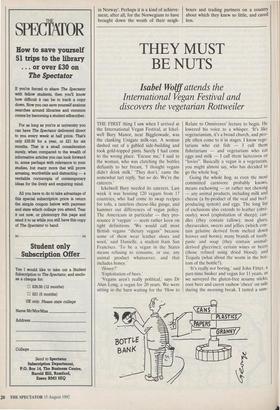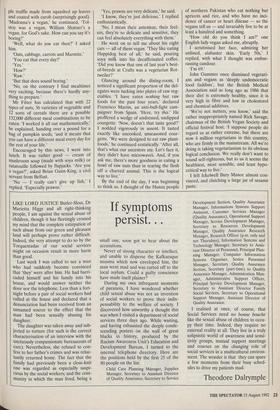THEY MUST BE NUTS
Isabel Wolff attends the International Vegan Festival and discovers the vegetarian Rottweiler
THE FIRST thing I saw when I arrived at the International Vegan Festival, at Ickel- well Bury Manor, near Biggleswade, was the clanking Unigate milk-van. A woman dashed out of a gabled side-building and took gold-topped pints. Surely I had come to the wrong place. 'Excuse me,' I said to the woman, who was clutching the bottles defiantly to her breast, 'I thought vegans didn't drink milk.' They don't,' came the somewhat tart reply, tut we do. We're the caterers.'
Ickelwell Bury needed its caterers. Last week it was housing 120 vegans from 17 countries, who had come to swap recipes for tofu, a tasteless cheese-like gunge, and hammer out differences of vegan policy. The Americans in particular — they pro- nounce it 'vaygun' — seem rather keen on tight definitions. 'We would call most British vegans "dietary vegans" because some of them wear leather shoes and wool,' said Danielle, a student fram San Francisco. 'To be a vegan in the States means refusing to consume, or use, any animal product whatsoever, and that includes honey.'
'Honey?'
'Exploitation of bees.'
'Vegans aren't really political,' says Dr Alan Long, a vegan for 20 years. We were sitting in the barn waiting for the 'How to
Relate to Omnivores' lecture to begin. He lowered his voice to a whisper. 'It's like vegetarianism, it's a broad church, and peo- ple often come to it in stages. I know vege- tarians who eat fish — I call them fishetarians — and vegetarians who eat eggs and milk — I call them lacto/ovos or "lovies". Basically a vegan is a vegetarian, you might almost say, who has decided to go the whole hog.'
Going the whole hog, as even the most committed carnivore probably knows, means eschewing — or rather not chewing — any animal products, including milk and cheese (a by-product of the veal and beef- producing system) and eggs. The long list of exclusions also extends to leather (obvi- ously); wool (exploitation of sheep); can- dles (they contain tallow); most glues, cheesecakes, sweets and jellies (which con- tain gelatine derived from melted down hooves and horns); many brands of tooth- paste and soap (they contain animal derived glycerine); certain wines or beers (those refined using dried blood); and Tequila (what about the worm in the bot- tom of the bottle?).
'It's really not boring,' said John Fitter, a part-time busker and vegan for 11 years, as we surveyed the gluten-free sesame sticks, root beer and carrot cashew `cheez' on sale during the morning break. I tasted a sam- pie truffle made from squashed up leaves and coated with carob (surprisingly good). 'Madonna's a vegan,' he continued, 7°1- stoy was a vegan, William Shatner's a vegan, for God's sake. How can you say it's boring?'
'Well, what do you eat then?' I asked him.
'Oats, cabbage, carrots and Marmite.' 'You eat that every day?'
`Yes.'
'How?'
`Raw.'
'But that does sound boring.'
'No, on the contrary I find mealtimes very exciting, because there's hardly any- thing to prepare.'
Mr Fitter has calculated that with 22 types of nuts, 36 varieties of vegetable and 12 sorts of cereals there are a possible 132,000 different meal combinations to be eaten. 'I worked it all out mathematically,' he explained, handing over a pound for a bag of pumpkin seeds, `and it means that you can have a different meal every day for the rest of your life.' Encouraged by this news, I went into lunch. It was rather good — cream of mushroom soup (made with soya milk) or ratatouille followed by flapjacks. `Are you a vegan?', asked Brian Gunn-King, a civil servant from Belfast.
'No — I really can't give up fish,' I replied. 'Especially prawns.' 'Yes, prawns are very delicate,' he said. 'I know, they're just delicious,' I replied enthusiastically.
'No, I mean their antennae, their feel- ers, they're so delicate and sensitive, they can feel absolutely everything with them.'
He went on to tell me about his eight cats — all of them vegan. 'They like eating Happidog best of all,' he said, pouring soya milk into his decaffeinated coffee. 'Did you know that one of last year's best- of-breeds at Crufts was a vegetarian Rot- tweiler?'
Glancing around the dining-room, I noticed a significant proportion of the del- egates were tucking into plates of raw veg- etables. 'I have eaten nothing but raw foods for the past four years,' declared Francisco Martin, an anti-bull-fight cam- paigner from Spain. 'Here, try this.' He proffered a wedge of undressed, undipped courgette. 'Now, doesn't that taste good?' I nodded vigorously in assent. It tasted exactly like uncooked, unseasoned cour- gette. 'We were designed to eat raw plant- foods,' he continued ecstatically. 'After all, that's what our ancestors ate. Let's face it, they didn't have microwaves. And, if you ask me, there's more goodness in eating a bowl of raw nuts than in tearing the flesh off a charred animal. This is the logical way to live.'
By the end of the day, I was beginning to think so. I thought of the Hunza people of northern Pakistan who eat nothing but apricots and rice, and who have no inci- dence of cancer or heart disease — so the vegans tell us — and invariably live to be at least a hundred and something.
`How old do you think I am?' one English lady vegan asked me, abruptly.
I scrutinised her face, admiring her unlined, alabaster skin. 'Early 50s,' I replied, with what I thought was embar- rassing candour.
'I'm 69.'
John Gummer once dismissed vegetari- ans and vegans as 'deeply undemocratic food faddists', but the British Medical Association said as long ago as 1986 that their diet is extremely healthy, since it is very high in fibre and low in cholestorol and chemical additives.
'We're not nutters, you know,' said the rather inappropriately named Rick Savage, chairman of the British Vegan Society and official festival host. 'I suppose people do regard us as rather extreme, but there are now 4 million vegetarians in this country, who are firmly in the mainstream. All we're doing is taking vegetarianism to its obvious logical conclusion. We really don't want to sound self-righteous, but to us it seems the healthiest, most sensible, and least hypo- critical way to live.'
I left Ickelwell Bury Manor almost con- vinced, and clutching a large jar of sesame paste.



















































 Previous page
Previous page